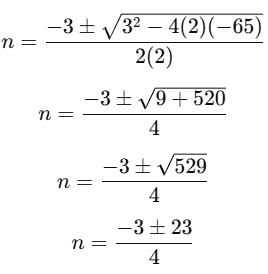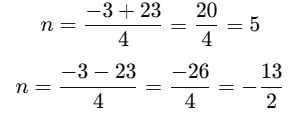JEE Exam > JEE Questions > If the mean of the squares of first n natural...
Start Learning for Free
If the mean of the squares of first n natural numbers be 11, then n is equal to
- a)13
- b)5
- c)- 13/2
- d)11
Correct answer is option 'B'. Can you explain this answer?
Verified Answer
If the mean of the squares of first n natural numbers be 11, then n is...
The mean of the squares of the first n natural numbers is given by:

The sum of the squares of the first n natural numbers is:

Thus, the mean is:

We are given that the mean is 11. Therefore:

Multiply through by 6:
(n+1)(2n+1)=66
Expand:
2n2 +3n+1=66
Simplify:
2n2+3n−65=0
Solve this quadratic equation using the quadratic formula:

Here, a=2, b=3, and c=−65:

Calculate the two solutions:

Since n must be a positive integer, n=5.

The sum of the squares of the first n natural numbers is:

Thus, the mean is:

We are given that the mean is 11. Therefore:

Multiply through by 6:
(n+1)(2n+1)=66
Expand:
2n2 +3n+1=66
Simplify:
2n2+3n−65=0
Solve this quadratic equation using the quadratic formula:

Here, a=2, b=3, and c=−65:

Calculate the two solutions:

Since n must be a positive integer, n=5.
Most Upvoted Answer
If the mean of the squares of first n natural numbers be 11, then n is...
**Given information:**
The mean of the squares of the first n natural numbers is 11.
**To find:**
The value of n.
**Solution:**
Let's first calculate the sum of the squares of the first n natural numbers.
The sum of the squares of the first n natural numbers can be calculated using the formula:
Sum = n(n+1)(2n+1)/6
Now, we are given that the mean of these squares is 11.
Mean = Sum/n
Substituting the value of Sum, we get:
11 = n(n+1)(2n+1)/6n
Simplifying further, we get:
11 = (n+1)(2n+1)/6
Multiplying both sides by 6, we get:
66 = (n+1)(2n+1)
Expanding the equation, we get:
66 = 2n^2 + 3n + n + 1
Rearranging the equation, we get:
2n^2 + 4n - 65 = 0
Now, we can solve this quadratic equation for n using factorization or the quadratic formula.
By factoring, we can write:
2n^2 + 4n - 65 = 0
(n + 13)(2n - 5) = 0
So, n can be either -13/2 or 5.
Since n represents the number of natural numbers, it cannot be a negative or fractional value. Therefore, the only valid solution is n = 5.
Hence, the correct answer is option B.
The mean of the squares of the first n natural numbers is 11.
**To find:**
The value of n.
**Solution:**
Let's first calculate the sum of the squares of the first n natural numbers.
The sum of the squares of the first n natural numbers can be calculated using the formula:
Sum = n(n+1)(2n+1)/6
Now, we are given that the mean of these squares is 11.
Mean = Sum/n
Substituting the value of Sum, we get:
11 = n(n+1)(2n+1)/6n
Simplifying further, we get:
11 = (n+1)(2n+1)/6
Multiplying both sides by 6, we get:
66 = (n+1)(2n+1)
Expanding the equation, we get:
66 = 2n^2 + 3n + n + 1
Rearranging the equation, we get:
2n^2 + 4n - 65 = 0
Now, we can solve this quadratic equation for n using factorization or the quadratic formula.
By factoring, we can write:
2n^2 + 4n - 65 = 0
(n + 13)(2n - 5) = 0
So, n can be either -13/2 or 5.
Since n represents the number of natural numbers, it cannot be a negative or fractional value. Therefore, the only valid solution is n = 5.
Hence, the correct answer is option B.
Free Test
FREE
| Start Free Test |
Community Answer
If the mean of the squares of first n natural numbers be 11, then n is...


|
Explore Courses for JEE exam
|

|
Similar JEE Doubts
If the mean of the squares of first n natural numbers be 11, then n is equal toa)13b)5c)- 13/2d)11Correct answer is option 'B'. Can you explain this answer?
Question Description
If the mean of the squares of first n natural numbers be 11, then n is equal toa)13b)5c)- 13/2d)11Correct answer is option 'B'. Can you explain this answer? for JEE 2025 is part of JEE preparation. The Question and answers have been prepared according to the JEE exam syllabus. Information about If the mean of the squares of first n natural numbers be 11, then n is equal toa)13b)5c)- 13/2d)11Correct answer is option 'B'. Can you explain this answer? covers all topics & solutions for JEE 2025 Exam. Find important definitions, questions, meanings, examples, exercises and tests below for If the mean of the squares of first n natural numbers be 11, then n is equal toa)13b)5c)- 13/2d)11Correct answer is option 'B'. Can you explain this answer?.
If the mean of the squares of first n natural numbers be 11, then n is equal toa)13b)5c)- 13/2d)11Correct answer is option 'B'. Can you explain this answer? for JEE 2025 is part of JEE preparation. The Question and answers have been prepared according to the JEE exam syllabus. Information about If the mean of the squares of first n natural numbers be 11, then n is equal toa)13b)5c)- 13/2d)11Correct answer is option 'B'. Can you explain this answer? covers all topics & solutions for JEE 2025 Exam. Find important definitions, questions, meanings, examples, exercises and tests below for If the mean of the squares of first n natural numbers be 11, then n is equal toa)13b)5c)- 13/2d)11Correct answer is option 'B'. Can you explain this answer?.
Solutions for If the mean of the squares of first n natural numbers be 11, then n is equal toa)13b)5c)- 13/2d)11Correct answer is option 'B'. Can you explain this answer? in English & in Hindi are available as part of our courses for JEE.
Download more important topics, notes, lectures and mock test series for JEE Exam by signing up for free.
Here you can find the meaning of If the mean of the squares of first n natural numbers be 11, then n is equal toa)13b)5c)- 13/2d)11Correct answer is option 'B'. Can you explain this answer? defined & explained in the simplest way possible. Besides giving the explanation of
If the mean of the squares of first n natural numbers be 11, then n is equal toa)13b)5c)- 13/2d)11Correct answer is option 'B'. Can you explain this answer?, a detailed solution for If the mean of the squares of first n natural numbers be 11, then n is equal toa)13b)5c)- 13/2d)11Correct answer is option 'B'. Can you explain this answer? has been provided alongside types of If the mean of the squares of first n natural numbers be 11, then n is equal toa)13b)5c)- 13/2d)11Correct answer is option 'B'. Can you explain this answer? theory, EduRev gives you an
ample number of questions to practice If the mean of the squares of first n natural numbers be 11, then n is equal toa)13b)5c)- 13/2d)11Correct answer is option 'B'. Can you explain this answer? tests, examples and also practice JEE tests.

|
Explore Courses for JEE exam
|

|
Signup to solve all Doubts
Signup to see your scores go up within 7 days! Learn & Practice with 1000+ FREE Notes, Videos & Tests.





























